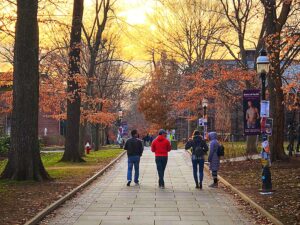Much has been written about what medical schools require of applicants; we have a fair few guides ourselves. Grades and MCAT scores, lists of extracurriculars, letters of recommendation and essays; students are expected to put a lot of effort into their applications. The question then becomes: what do medical schools do with all of it? How do they decide who to admit, waitlist, and deny?
We’re going to investigate this in this article. While each medical school has its own policies and priorities, they have a common purpose in selecting and educating the next generation of doctors. Thus, the general outline of how they evaluate candidates is consistent. We’ll go through this point by point, so you can understand how your own application will be evaluated, and how best to position yourself. Let’s get started!
A Note on Holistic Admissions
Medical schools evaluate applicants holistically. This means they look at every aspect of your application to build a picture of you as a candidate, and evaluate you in the context of your circumstances. Unlike some undergraduate colleges, like UT Austin, there are no guaranteed admissions to medical school with certain grades or test scores.
This isn’t to say that grades and test scores don’t matter (we’ll cover that more later), but that who you are is more than the sum of your parts. Admissions officers take all of these disparate pieces of you and try to put them together into a great whole to gain a sense of who you are, and who you could be.
GPA
Your GPA is the first thing admissions officers look at, and is one of the two most important factors in your admissions. Medical school is a lot of work academically, and medical schools only want to admit students who have sufficient preparation and work ethic to tackle it.
Your GPA in college level coursework is used as the first barometer for this. A high GPA is not enough on its own to gain acceptance, but a low one may get you rejected. Your academic proficiency is like the bar in a high jump; it doesn’t matter if you clear the benchmark by feet or inches, but you must pass it.
There is some flexibility with GPA, as the courses offered and character of instruction can vary greatly between (or even within) colleges. This is especially true as many schools are known to practice grade inflation (while a few, including Princeton, are known for grade deflation). How much an individual medical school takes this into account varies.
Your own grade point average should be within .2 of the school’s average, either above or below. If you are more than .5 below average, this is not a good choice of school for you. If your grades are too low in undergrad, then a post-bacc or master’s program can be another chance to demonstrate your academic fitness for medical school.
MCAT Scores
The other key thing medical schools look at initially are your MCAT scores. These are of equivalent importance to your GPA, and for similar reasons: to make sure you have a sufficient grasp on the academic material you will be covering in medical school. Unlike GPA, however, MCAT scores are standardized, with every student sitting for the exact same test under similar circumstances.
Generally, a higher GPA can supplement lower MCAT scores, or the reverse. There are limits to this of course; you are expected to perform well on both. That said, both demonstrate proficiency in the needed academic material for medical school, so a higher score on one can offset weakness in the other.
Extracurriculars
Extracurriculars are an entire suite of activities you are expected to participate in. We’ll cover each individually, but overall you are assessed on whether you covered all of them. Having one lacking entirely is a mark against your application. Medical schools learn about these through your description of them in your activities section, and through your essays.
Shadowing
Shadowing is important as a way to demonstrate familiarity with the day to day of medicine. Being a doctor is a major commitment, and medical schools want to be certain you know what you’re signing up for. In that respect, shadowing is much more a check box; it doesn’t tell medical schools very much about who you are as a candidate, but rather that you’ve done the legwork to be sure that medicine is the right field for you.
If you are applying to DO schools, make sure you have had the chance to shadow a DO physician.
Research
Not all doctors do research, though some do. What medical schools are looking for here is a demonstration that you understand the scientific method and principles behind discoveries. You don’t need to be an expert in every field, but should be conversant in how discoveries happen.
Note that you do not need to participate solely in laboratory research; field research fulfills this requirement equally well. Indeed, doing field research in the sciences can help set your application apart, as a novel experience or insight. You are evaluated on the depth of your involvement; generally longer term commitments are more impressive.
Gaining research publications is impressive, but not required, especially if you are working as part of a larger team.
Clinical Experience
A significant portion of medicine is dealing with people; the sick and the injured, their families, and your fellow healthcare practitioners. These are skills which are difficult to learn or test in a classroom; for your clinical experience medical schools are looking for a confirmation of this experience.
A variety of experiences is helpful here. Not all of them need to be directly patient facing, but it is good if a number of them are. Committees will consider both the breadth and depth of your clinical experiences. We recommend having two distinct ones, but a single one may suffice if it is significantly in depth and expansive.=
Volunteering
Medicine is about helping others, and medical schools look for a trend of you doing this in your activities. In this, commitment over time is the most important factor. While volunteering in a healthcare setting is a popular option, it is not a requirement; any kind of volunteering will do. That said, working with varied populations while volunteering is encouraged, as this mimics the diversity of people you will encounter in medicine.
A long term devotion to your volunteering activities is key. Having one volunteering activity you pursue for several years is worth more than a scattering of others which you do and then stop. This isn’t to discourage short term options, simply to say that being able to demonstrate commitment is important.
Letters of Recommendation
Medical schools view letters of recommendation as a verification of the information they gain from your GPA. A transcript tells these schools how you performed as a student, but not who you are as a scholar and researcher. A good letter will boost your application slightly, but generally confirms what they want to see.
Letter writers will not provide one for you if they cannot speak positively about you, but they may have little to say. A bland or uninformative letter can hurt your application. Also, while recommenders will not speak badly about you in a letter, you should be certain that anyone you ask will be able to write a letter without reservations.
One letter should come from a physician, one you met during shadowing or clinical experiences. They can speak directly to your aptitude for the field. This is an important letter, as being a doctor goes beyond just academics, and this letter addresses that. If you are applying to DO programs, you will need a letter from a DO physician.
Essays
Your essays are how medical schools get to know you as a person. The rest of the application shades around the edges; in the essays you speak to them directly about who you are, what you have done thus far, and what your goals are in medicine.
When evaluating your essays, medical schools are looking for a few things. The first, and simplest, are the answers to the following questions (which are usually also expressed in the essay prompts):
- Why do you want to be a doctor?
- What experiences do you have that have drawn you to and prepared you for medicine?
- Why do you want to study at our school specifically?
The next thing they are looking for is an authentic sense of who you are as a person. They want to understand your values, and see what drives and motivates you. They need a sense of who you are, so they can see how you will fit in with their program. This is true of both your personal statement, and any supplemental essays the school requires.
Medical schools don’t directly evaluate your grammar and use of prose, but you should still submit a well-written essay, for the sake of clarity if nothing else.
Interviews
If you are offered an interview, it means the admissions committee reviewed the rest of your application, and thought that you may be a good fit for their program. That said, words on a page can only tell you so much, so medical schools use a system of trust, but verify. The interview is their opportunity to make sure you really are what you represent yourself as in your application.
Being a doctor does require people skills, and interviews are a chance to evaluate those as well. Admissions officers are watching your presentation as much as the content of your answers. Being nervous is fine, but you should try to be the best version of yourself when interviewing. For the answers you give, try to stick close to the essay answers you gave if the questions are similar. Your interviewers will have read your application, and may have questions if the answers don’t match.
Final Thoughts
Medical schools are very competitive for admissions, and look carefully at every application submitted to see if it has what they are looking for. While each medical school has their own admissions quirks and desires, we hope this article has been a solid introduction to how medical school admissions committees read applications, and what they’re looking for when they do.
Of course, crafting the perfect application for medical school is very difficult, even if you know what they want to see. There are many moving parts, and strict deadlines to stick to. If you are looking for help with any part of the application process, no matter where you are along it, schedule a free consultation today to learn how we can help you.








